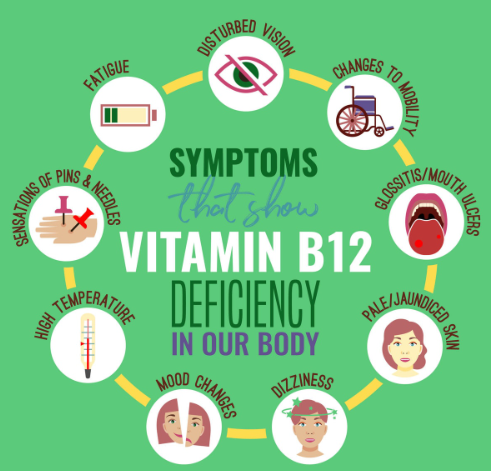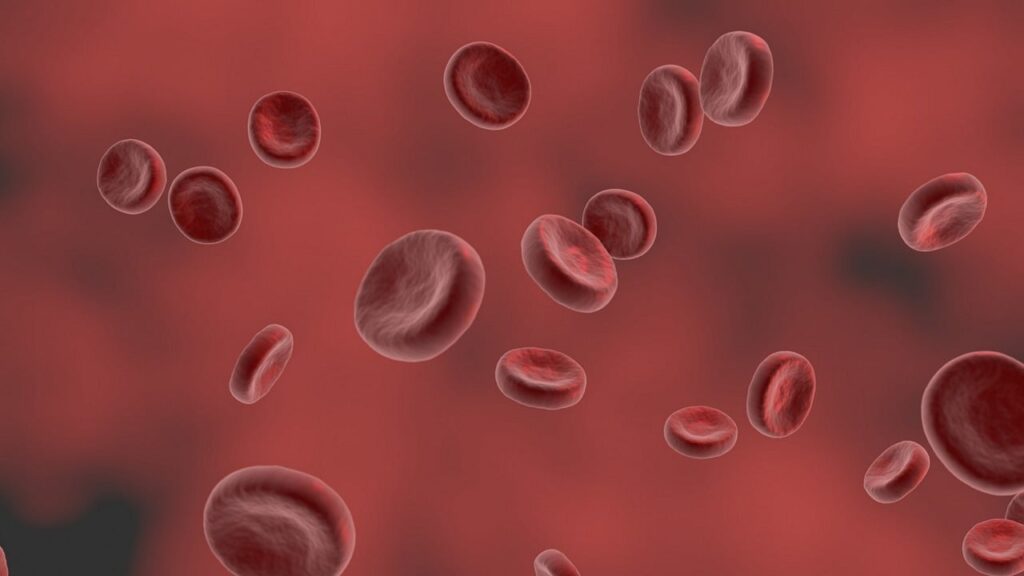What Are the Worst Symptoms of B12 Deficiency?
The most severe symptoms of Vitamin B12 deficiency include:
- Severe Anemia: Causing extreme fatigue, weakness, and shortness of breath.
- Neurological Changes: Memory loss, difficulty walking, numbness, and tingling in hands and feet.
- Cognitive Impairments: Confusion, depression, and mood swings.
- Vision Problems: Blurred or disturbed vision due to optic nerve damage.

What Happens If Vitamin B12 Is Low?
Low levels of Vitamin B12 can lead to:
- Megaloblastic Anemia: Large, abnormal red blood cells that can’t carry oxygen efficiently.
- Nerve Damage: Resulting in neuropathy, which can cause permanent nerve damage if untreated.
- Mental Health Issues: Depression, irritability, and cognitive decline.
Who Suffers Most from B12 Deficiency?
- Elderly: Reduced absorption capability due to decreased stomach acid.
- Vegans and Vegetarians: B12 is primarily found in animal products.
- Individuals with Gastrointestinal Disorders: Conditions like Crohn’s or celiac disease impair absorption.
- Pregnant and Breastfeeding Women: Higher demands for B12 that may not be met through diet alone.
How Can I Raise My B12 Levels Fast?
- Dietary Changes: Incorporate B12-rich foods like meat, dairy, and eggs.
- Supplements: Oral or sublingual B12 supplements can boost levels quickly.
- Fortified Foods: Consume cereals and plant-based milks fortified with B12.
- Medical Treatment: B12 injections or high-dose oral supplements for severe deficiencies.
Checking B12 Levels at Home
Home Testing Kits
- Purchase a Kit: Home testing kits for B12 levels are available online or at pharmacies.
- Follow Instructions: Each kit will have specific instructions, usually involving a finger prick to collect a small blood sample.
- Send Sample: The sample is sent to a lab for analysis.
- Receive Results: Results are typically received within a few days, either online or via mail.
Symptoms Monitoring
- Fatigue and Weakness: Persistent tiredness can be a sign of B12 deficiency.
- Nerve Symptoms: Numbness or tingling in the hands and feet.
- Cognitive Changes: Memory issues, mood swings, or confusion.
Consulting a Professional
- Doctor’s Advice: Consult a healthcare provider if home test results indicate low B12 levels or if symptoms persist.
Home testing kits provide a convenient way to check B12 levels, but professional consultation is recommended for accurate diagnosis and treatment.
What Organ is Affected by B12 Deficiency?
Vitamin B12 deficiency can affect several organs and systems in the body, primarily:
- Nervous System: B12 deficiency can lead to neurological symptoms such as tingling and numbness in the hands and feet, difficulty walking, memory loss, mood changes, and even cognitive decline.
- Blood: The deficiency can cause megaloblastic anemia, characterized by the production of abnormally large and dysfunctional red blood cells. Symptoms include fatigue, weakness, and pallor.
- Gastrointestinal Tract: It can cause glossitis (inflammation of the tongue), mouth ulcers, and potentially digestive issues.
- Cardiovascular System: While indirectly, severe and prolonged B12 deficiency can affect heart health due to anemia and the increased strain on the cardiovascular system.
Will B12 Increase Hemoglobin?

Yes, vitamin B12 can help increase hemoglobin levels, particularly in individuals with B12 deficiency anemia. Hemoglobin is a protein in red blood cells responsible for carrying oxygen throughout the body. B12 is essential for the production and maturation of red blood cells. When there is a deficiency, the body cannot produce enough healthy red blood cells, leading to anemia and low hemoglobin levels. By correcting the B12 deficiency through diet, supplements, or injections, hemoglobin levels can improve as the production of healthy red blood cells resumes.
Which Dry Fruits are Rich in Vitamin B12?
No dry fruits (or fruits in general) are naturally rich in vitamin B12. Vitamin B12 is primarily found in animal products, and plant-based sources do not naturally contain significant amounts of this vitamin. However, some foods are fortified with B12, but these are typically not dry fruits.
For those on plant-based diets, fortified foods such as:
- Fortified Cereals
- Fortified Plant Milks (e.g., soy milk, almond milk)
- Nutritional Yeast
are common sources of vitamin B12.
Summary
- Affected Organs: Nervous system, blood, gastrointestinal tract, and cardiovascular system.
- Hemoglobin Increase: Yes, B12 can increase hemoglobin by correcting deficiency-related anemia.
- Dry Fruits and B12: No dry fruits are rich in vitamin B12; it is primarily found in animal products and fortified foods.
What are the main causes of B12 deficiency?
Vitamin B12 deficiency can occur for various reasons. Here are the main causes:
1. Dietary Insufficiency
- Vegan or Vegetarian Diet: Since vitamin B12 is primarily found in animal products, individuals who follow a vegan or strict vegetarian diet are at higher risk of deficiency.
- Inadequate Intake: Even those who consume animal products might not get enough B12 if their diet lacks diversity.
2. Malabsorption Issues
- Pernicious Anemia: This autoimmune condition affects the stomach lining and reduces the production of intrinsic factor, a protein necessary for B12 absorption.
- Gastrointestinal Disorders: Conditions such as Crohn’s disease, celiac disease, and bacterial overgrowth can impair the absorption of vitamin B12.
- Surgical Procedures: Surgeries that affect the digestive tract, such as gastric bypass or bowel resection, can reduce B12 absorption.
3. Age-Related Factors
- Decreased Stomach Acid Production: As people age, their stomachs produce less hydrochloric acid, which is necessary for B12 absorption from food.
- Atrophic Gastritis: This condition, common in older adults, leads to a thinning of the stomach lining and reduced acid production, impairing B12 absorption.
4. Medications
- Proton Pump Inhibitors (PPIs): These medications, used to treat acid reflux and peptic ulcers, reduce stomach acid production and can affect B12 absorption.
- Metformin: Commonly used for diabetes, metformin can interfere with B12 absorption over time.
- H2 Receptor Antagonists: These drugs also reduce stomach acid and can impair B12 absorption.
5. Genetic Factors
- Inherited Conditions: Some genetic disorders can affect the body’s ability to absorb or metabolize vitamin B12.
6. Alcohol Abuse
- Chronic alcohol consumption can interfere with nutrient absorption, including B12, and damage the stomach lining.
7. Long-term Use of Certain Medications
- Antibiotics: Long-term use can affect gut bacteria and impair B12 absorption.
- Chloramphenicol: This antibiotic can affect B12 absorption and is rarely used due to its potential side effects.
8. Inadequate Breastfeeding
- Infants breastfed by mothers with low B12 levels or on strict vegan diets without supplementation may develop a deficiency.
Symptoms of B12 Deficiency
- Fatigue and Weakness
- Anemia
- Nerve Problems (e.g., tingling, numbness)
- Cognitive Issues (e.g., memory problems, confusion)
- Mood Disturbances (e.g., depression)
- Pale or Jaundiced Skin
- Glossitis and Mouth Ulcers
- Vision Problems
Addressing B12 Deficiency
If you suspect you have a B12 deficiency, it’s essential to consult with a healthcare professional. Treatment might include dietary adjustments, oral supplements, or intramuscular B12 injections, depending on the underlying cause and severity of the deficiency.
Conclusion
Understanding and managing Vitamin B12 deficiency is crucial for maintaining overall health. By recognizing symptoms early and making dietary or lifestyle adjustments, one can effectively prevent and treat this deficiency.








